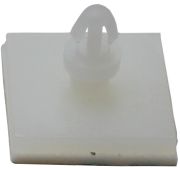Many incoming orders so deliveries are around one weeks behind.
Important - US shipping!
Due to the unpredictable US administration, US import taxes are still very messy.
From recent shipments it seems to be around 12% + a handling fee.
The Swedish Postal service has launched a new small package delivery to US and we are testing it, but to use this service the US import tax must be charged in advance.
For UPS and FedEx shipping services, the shipping company bills the recipient for the import tax + an additional service charge.
Sound card
A sound card primarily intended for use with a switch decoder.
If the barrier on a railroad crossing are controlled by a servo/servo decoder, then the decoder can use this card to play warning bells.
The card has 4 inputs and when an input is triggered, the corresponding sound is played. The sound is played as long as the input is activated.
The input can be activated at either high or low signal.
The card has an USB connector for connection to a PC. Here you can upload your own sound to the card using the included program.
The card plays MP3 files.
The card has a connection for speaker, about 8 Ohm, and has an output power of about 1 watt.
There are also sockets for connection to amplifiers, which gives a high quality sound.
The card is powered by 5volt which can be taken from the decoder.
The card comes preloaded with recording of:
1. The railway crossing in Börringe (double clocks)
2. Pedestrian crossing at the train plattforms at Svedala station
3. Railway crossing with old clocks in Mariefred (recorded by Anders Svenson).
These recordings are preloaded on the card but can also be downloaded here as a zip-file.
These sounds are played when the respective input (1 - 4) is activated. The input is activated by switching the input to 5volt.
If the two jumpers are moved to the right (as shown below), the input can instead be activated by connecting to 0 (minus the 5-volt terminal).
If the sound card is to be controlled by e.g. the servo decoder, for example, input 1 on the sound card is connected to the output X3 on the servo encoder. If the decoder is configurated so that X3 should follow a servo, then you can get sound eg. when the servo moves in one direction (lowers barriers).
If the sound card is used together with the servo decoder, the card can preferably take its power from the servo card by connecting the 5-volt terminals of the two cards together.
If the cards are supplied with different power sources, then the minus of the cards on the terminals must be connected so that they get common "zero".

Add your own sounds
The card is based on a small Chinese card, the JQ6500.
This card is quite competent with good sound. You can add your own mp3 files by connecting it via USB to a windows computer.
The disadvantage of the card is that the program for loading files is in Chinese! See the instruction below to download files.
Connect the card with a USB micro cable to a Windows computer.
The card will appear as a new disk.
Open the disk - either the sound program will start automatically or the disk will open with the program visible. If the program is not started, start it from the opened disk.
The program opens a window with tabs.
(1) Select the second tab from the left.
(2) Press the button.
Now the "file browser" comes up. Locate the files to load.
When all files have been added, the window looks like below.

Switch to the first tab (1) and then load the files by pressing the button (2).
After a little while, the charging begins and then it fills the lower box green.
When the text around the button is changed, the files are loaded.
It may take a minute or two before charging starts.
Close the drive and disconnect the USB cable. Check that the sounds was loaded as intended.
NOTE, the program copies the files as selected and deletes the original sound files on the sound card!




 Servodecoder 5
Servodecoder 5


